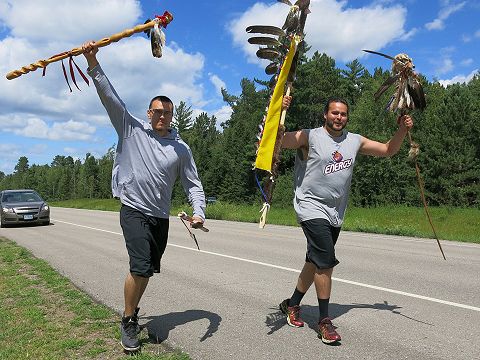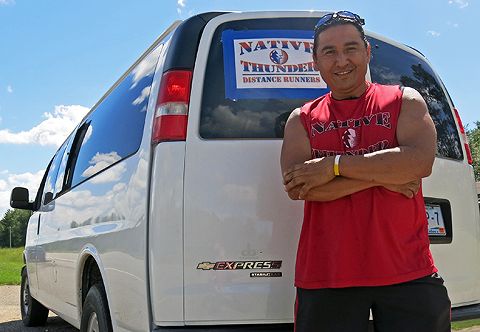 |
Canku Ota
|
 |
|
(Many Paths)
|
||
|
An Online Newsletter
Celebrating Native America
|
||
|
August 2015 - Volume
13 Number 8
|
||
|
|
||
|
Runners Cover 200
Miles On Anishinabe Spirit Run
|
||
|
by John Enger ·
Minnesota Public Radio News
|
||
|
credits: all photos be
John Enger - Minnesota Public Radio News
|
Sam Strong is running. He left Redby, Minn., in the Red Lake Nation on Wednesday with 50 other runners. Then, he and a smaller group headed for Leech Lake, aiming for Duluth. Friday they will run straight into a pow wow on the Fond du Lac reservation. They're running 200 miles to encourage sobriety as part of the Anishinabe Spirit Run. It's the 19th run of its kind, and Strong's 7th in as many years. "This run is huge for me," he said, resting on the side of State Highway 89 Wednesday afternoon. Alcoholism landed Strong, 31, in some life-threatening situations when he was a teenager. He didn't want to elaborate, saying only that he ended up in a rehab facility with doctors telling him he was lucky to be alive. Running became a form of therapy — the Spirit Run, a way to share its positive impact on his life. Event coordinator and former Red Lake Chairman Floyd "Buck" Jourdain said runners "crow-hop" the 200 miles. On long stretches they take turns, running two or three at a time for about half a mile. The goal, he said, is to carry four "Spirit Staves" all the way to Fond du Lac on foot. "The staves are vital," Jourdain said.
Addiction is a major problem on many Indian reservations — a fact brought home by a recent drug bust which netted 41 arrests on the Red Lake and White Earth reservations. Jourdain said the staves — which represent sobriety, suicide prevention, youth and the Ojibwe language — are meant to bring healing to native peoples. For Strong, those staves carry a special meaning this year. Last fall he was diagnosed with Stage Three testicular cancer. He went through surgery and chemotherapy. His long hair fell out. After nine years of sobriety, he found himself revisiting the same dark places alcohol once brought on. "When I was first going through chemo," he said, "I told my mother, 'It's kind of like you're drunk without all the good feelings.'" He credits his traditional spirituality and prayer with carrying him through. For most, the run is about staying clean. For Strong, it's about something he called mino-bimaadiziwin. "It means the good life," he said. As he spoke, the staff runners jogged past. He caught up to relieve them, gripping a staff in each hand. One of his friends did the same. They raised staves overhead and together let out a scream. |
||||
|
|
||
|
|
||
| Canku Ota is a free Newsletter celebrating Native America, its traditions and accomplishments . We do not provide subscriber or visitor names to anyone. Some articles presented in Canku Ota may contain copyright material. We have received appropriate permissions for republishing any articles. Material appearing here is distributed without profit or monetary gain to those who have expressed an interest. This is in accordance with Title 17 U.S.C. Section 107. | ||
|
Canku Ota is a copyright ©
2000 - 2015 of Vicki Williams Barry and Paul Barry.
|
||
 |
 |
|
|
The "Canku
Ota - A Newsletter Celebrating Native America" web site and
its design is the
|
||
|
Copyright ©
1999 - 2015 of Paul C. Barry.
|
||
|
All Rights Reserved.
|
||

